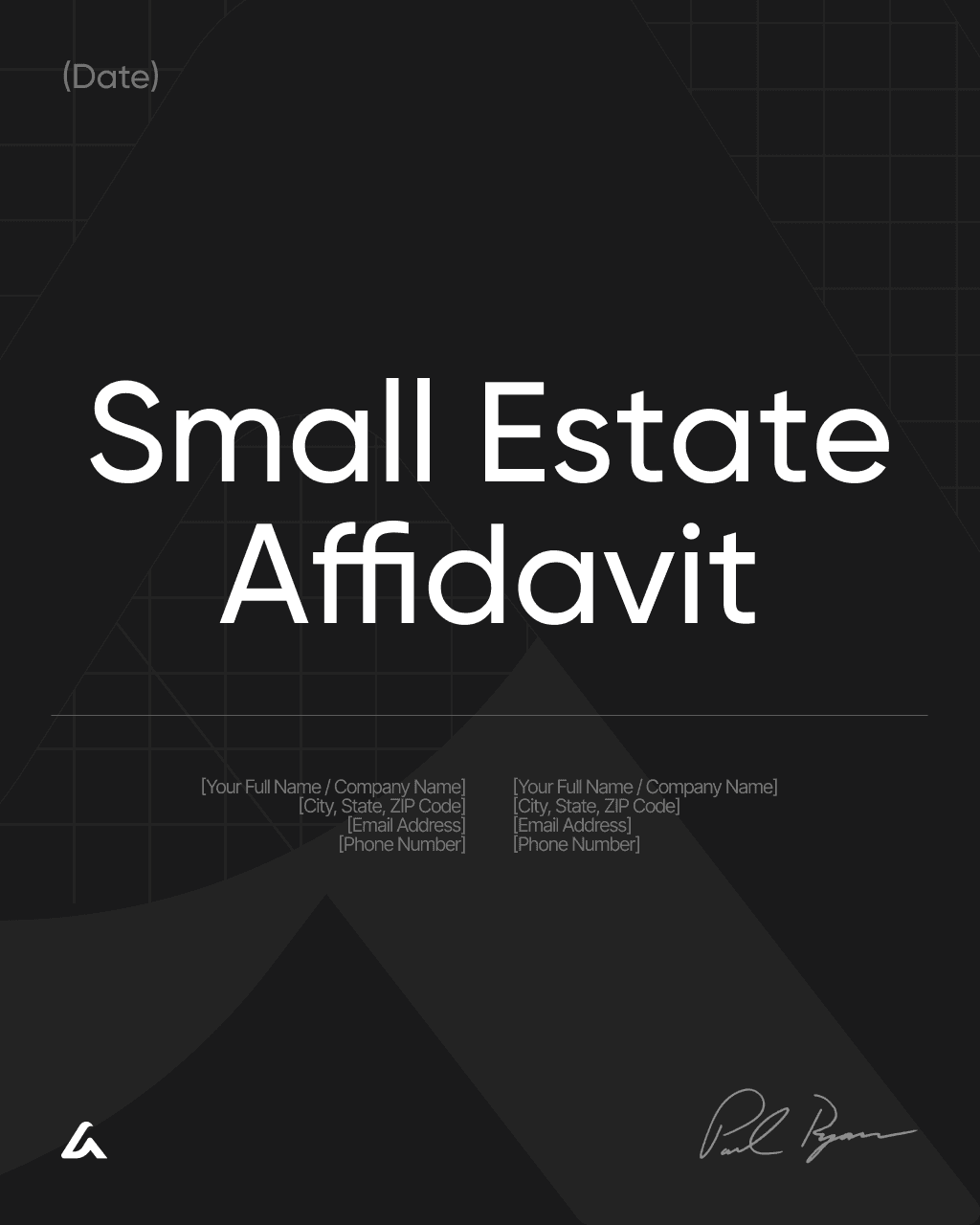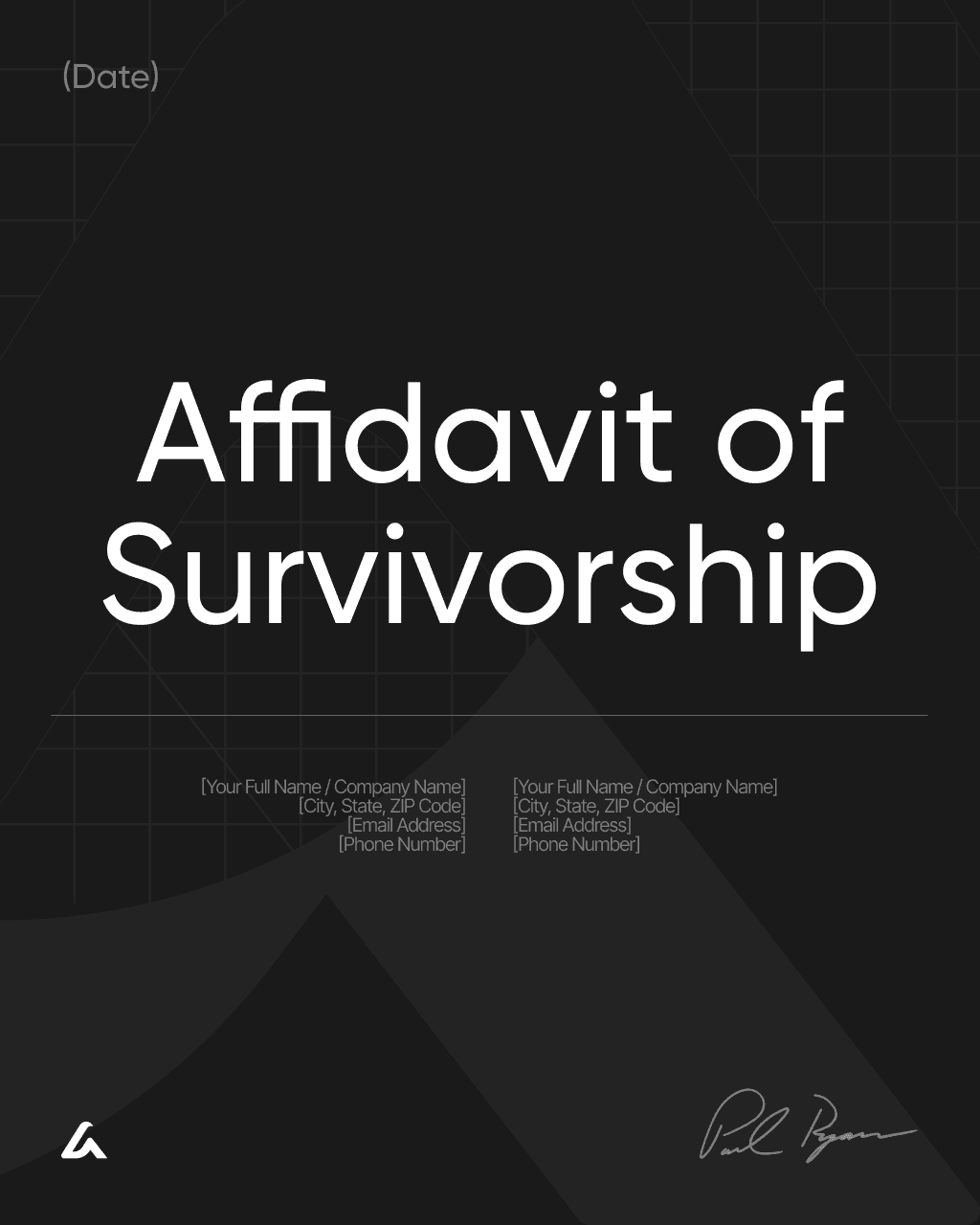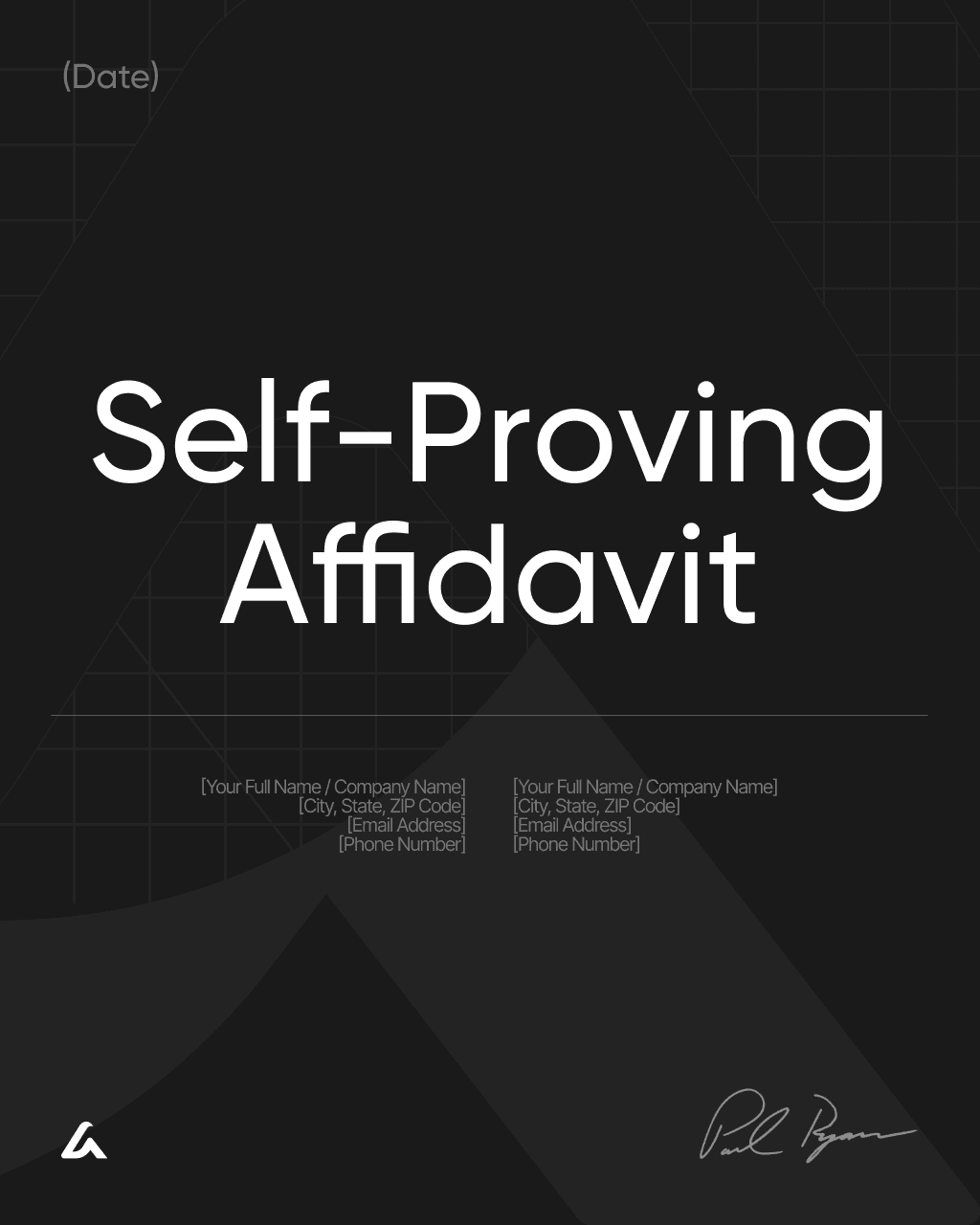Template category
Last Will and Testament
Essential templates for invoices, receipts, order forms, client agreements, and more.
Last Will and Testament
Table of Contents
1. Essential Testamentary Documents Overview
1.1 Self-Proving Affidavit (Sample Language)
1.2 Holographic Last Will
1.3 Last Will and Testament
1.4 Living Will / Advance Directive Template
1.5 Mutual Wills Agreement Template
1.6 Will with Testamentary Trust Template
1.7 Affidavit of Witness to a Will Template
1.8 Small Estate Affidavit Template
1.9 Affidavit of Survivorship Template
1.10 Self-Proving Affidavit Template
2. Jurisdictional Peculiarities of Wills in the USA
2.1 West Coast: California and Washington
2.2 Northeast: New York
2.3 Southern States: Texas and Florida
2.4 Midwest: Illinois
3. 2024–2025 Developments in Digital Wills and Probate
3.1 Digital Wills & Modern Estate Execution
3.2 Electronic Will Legislation & Blockchain Verification
3.3 Remote Witnessing & AI-Powered Estate Planning
3.4 The Rise of Fully Digital Estate Ecosystems
3.5 Smart Contracts & Automated Inheritance
3.6 Cloud Storage, Cybersecurity & the Future of Will Authentication
4. Conclusion: Using AI Templates to Ensure Testamentary Clarity and Legal Validity
1. Essential Testamentary Documents Overview
Even in today’s digital era, a Last Will and Testament remains one of the most essential legal documents an individual can create. It defines how your property, digital assets, and personal wishes will be handled after death — ensuring clarity, fairness, and legal certainty. Without a valid will, your estate is subject to rigid state intestacy laws, which often fail to reflect your true intentions. For anyone who owns property, has dependents, or wishes to control how their legacy is managed, a will transforms uncertainty into a clear, enforceable plan.
A properly drafted will prevents confusion and conflict among heirs, providing legal recognition of your choices regarding inheritance, guardianship, and executorship. It ensures that loved ones, charities, or partners receive what you intend — not what the state assumes. From real estate and investments to digital assets like social media accounts or cryptocurrency, wills bridge the gap between traditional and modern wealth. In blended families or non-traditional arrangements, a clear will can prevent disputes and lengthy probate battles.
Structured, lawyer-reviewed templates simplify the process of creating a compliant will. They guide you through each decision — naming beneficiaries, appointing an executor, specifying guardians for minors, and outlining special bequests — while ensuring that all statutory formalities are met. A well-prepared will is not only a legal safeguard but also a compassionate act, reducing stress for those you leave behind and ensuring that your values are carried forward with dignity.
Modern AI-assisted drafting tools, such as AI Lawyer, are revolutionizing how wills are created and maintained. These intelligent systems incorporate state-specific probate rules, adapt to evolving estate laws, and help you manage both physical and digital assets with precision. Whether you’re a young professional starting to build wealth or managing complex holdings across jurisdictions, AI-driven templates make estate planning accessible, accurate, and secure.
Quick Highlights
Legal Certainty: Ensures assets are distributed according to your wishes, not default intestacy laws.
Protection for Loved Ones: Allows you to appoint guardians, executors, and beneficiaries clearly — avoiding court intervention.
Conflict Prevention: Reduces family disputes by providing an enforceable record of your intentions.
Digital-Age Compatibility: Covers both tangible and digital property, including crypto, online accounts, and intellectual assets.
AI-Enhanced Drafting: Intelligent templates update clauses to reflect current legal requirements, ensuring every will remains compliant and valid.
Related Legal Resources
If you're preparing a will, you may also need these legal tools for securing your assets and documenting key decisions:
1.1 Self-Proving Affidavit (Sample Language)

A Self-Proving Affidavit is a short, notarized statement attached to a will that confirms it was executed properly: the testator signed voluntarily, was of sound mind, and did so in the presence of witnesses who also signed. By memorializing those facts under oath at the time of execution, the affidavit makes the will “self-proving,” allowing the probate court to accept it without later calling witnesses to testify. A standard affidavit identifies the testator and witnesses, recites proper execution, includes the venue and date, and bears a notary’s jurat and seal. Because witnesses may be unavailable years later, this document functions as pre-verified evidence of authenticity and materially streamlines probate in most U.S. jurisdictions (noting a few states require different procedures).
Using a structured Self-Proving Affidavit Template brings speed, certainty, and compliance to estate planning. It ensures every required element is present, reduces the risk of probate delays and additional hearings, and lowers costs for the estate by removing the need to “track down” witnesses after death. Modern templates also incorporate jurisdiction-specific formalities and signature blocks, making it easy to execute the affidavit alongside the will. With AI Lawyer’s intelligent drafting, you can generate a state-tailored affidavit with the correct attestations, notary language, and formatting—ready for signing and safe storage with the original will.
Download Template: Self-Proving Affidavit (Sample Language)
For more information please refer to our article: Self-Proving Affidavit (Sample Law) Template 2025 (Free Download + AI Generator)
Or create your own document yourself with the help of AI.
1.2 Holographic Last Will

A Holographic Will is an unwitnessed handwritten testament entirely in the testator’s own handwriting. It is typically created in urgent or informal situations — for example, when a person is unable to access witnesses or a notary, such as during illness, travel, or an emergency. To be valid, a holographic will must clearly show testamentary intent (“this is my last will”), identify beneficiaries, describe property or bequests, and be signed — and, in some jurisdictions, dated — by the testator. Because it lacks witnesses, courts require the entire material content and signature to be in the testator’s handwriting. While states such as California, Texas, and Louisiana recognize holographic wills, others — including Florida, Georgia, and Illinois — reject them entirely. The result is a complex patchwork of laws: a holographic will valid in one jurisdiction may be disregarded in another, creating serious risks if the testator relocates or owns property across state lines.
Using a structured Holographic Will Template helps ensure that handwritten wills meet all essential elements and minimize ambiguity. Though intended as a last-resort estate planning tool, a properly formatted holographic will can still provide enforceable guidance when formal execution is impossible. However, it remains prone to disputes over handwriting authenticity, unclear language, and omitted provisions (such as executors or residuary clauses). Modern AI-powered drafting tools like AI Lawyer mitigate these issues by generating jurisdiction-specific templates that outline the required handwritten components, recommended language, and attestation instructions. This allows individuals to create emergency wills that are clearer, legally safer, and more likely to be upheld — while encouraging formal execution when circumstances allow.
Download Template: Holographic Last Will
For more information please refer to our article: Holographic Last Will Template (Free Download + AI Generator)
Or create your own document yourself with the help of AI.
1.3 Last Will and Testament

A Last Will and Testament is the foundational estate planning document that directs how an individual’s property, assets, and personal wishes are to be handled after death. It designates beneficiaries, appoints an executor to administer the estate, and may name guardians for minor children or dependents. A valid will provides legal certainty — ensuring that your estate passes according to your intentions rather than default state intestacy laws. Without one, courts determine heirs based on statutory formulas that may exclude partners, friends, or charities. A properly drafted will clarifies inheritance, prevents disputes, and allows you to address both traditional and digital assets, including online accounts and cryptocurrencies. In modern estate planning, the will remains the ultimate safeguard of personal autonomy and family clarity.
Using a structured Last Will and Testament Template ensures that every critical element — from identification of heirs and executors to attestation clauses and signatures — is included in a compliant format. It standardizes the process, minimizes errors, and streamlines probate by making the document legally self-sufficient. Today’s AI-powered drafting tools, such as AI Lawyer, take this further by automatically adapting each will to state-specific execution laws, integrating updates in inheritance and digital asset regulations, and guiding users through every clause. The result is a customized, legally sound testament that provides peace of mind — protecting your loved ones, honoring your intentions, and preserving your legacy with precision.
Download Template: Last Will and Testament
For more information please refer to our article: Last Will and Testament Template (Free Download + AI Generator)
Or create your own document yourself with the help of AI.
1.4 Living Will / Advance Directive Template
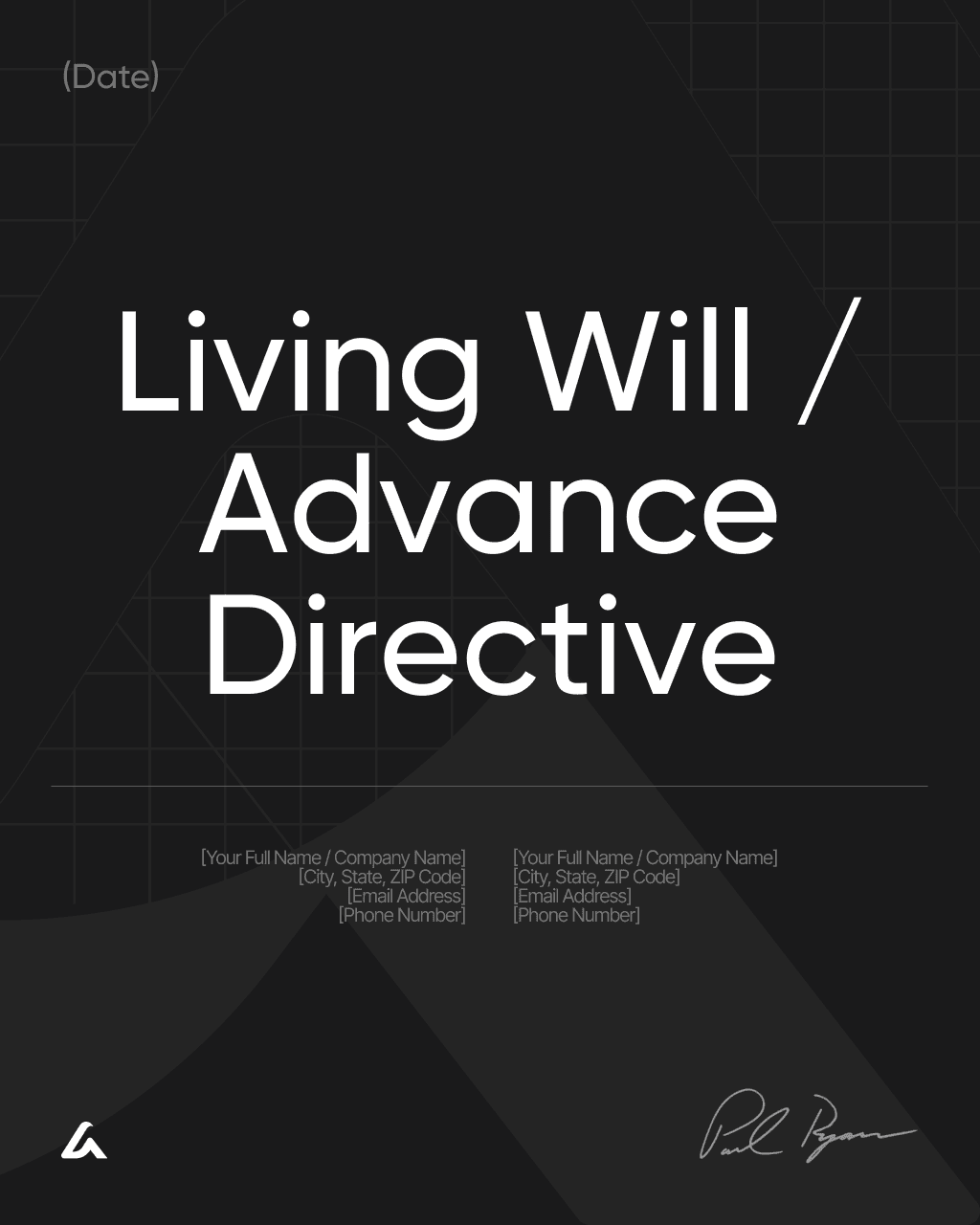
A Living Will, also known as an Advance Directive, is a legal document that allows a person to state their healthcare preferences in advance in case they become unable to communicate or make medical decisions. It is commonly used to address end-of-life care and critical treatment choices, such as whether to receive life-sustaining treatment, artificial nutrition or hydration, resuscitation, or mechanical ventilation. The primary purpose of a living will is to ensure that medical providers and family members understand and follow the individual’s wishes, reduce uncertainty during emergencies, and prevent disputes about care decisions.
Using a standardized Living Will / Advance Directive template helps ensure the document is clear, comprehensive, and consistent with common medical and legal standards - including identification details, statements regarding decision-making capacity, and specific instructions about treatment preferences in different medical scenarios. The template often includes guidance on comfort care and pain management, preferences regarding organ donation, and the ability to appoint or reference a healthcare proxy if used alongside a medical power of attorney. AI-powered legal drafting tools like AI Lawyer help users generate customized advance directives tailored to jurisdiction-specific rules, including signing formalities such as witnesses or notarization. By guiding users through key healthcare choices and using precise legal language, the platform helps create a professional, legally valid directive that supports autonomy, provides clarity for loved ones, and helps ensure medical decisions align with the individual’s values.
Download Template: Living Will / Advance Directive Template
For more information please refer to our article:
Or create your own document yourself with the help of AI.
1.5 Mutual Wills Agreement Template
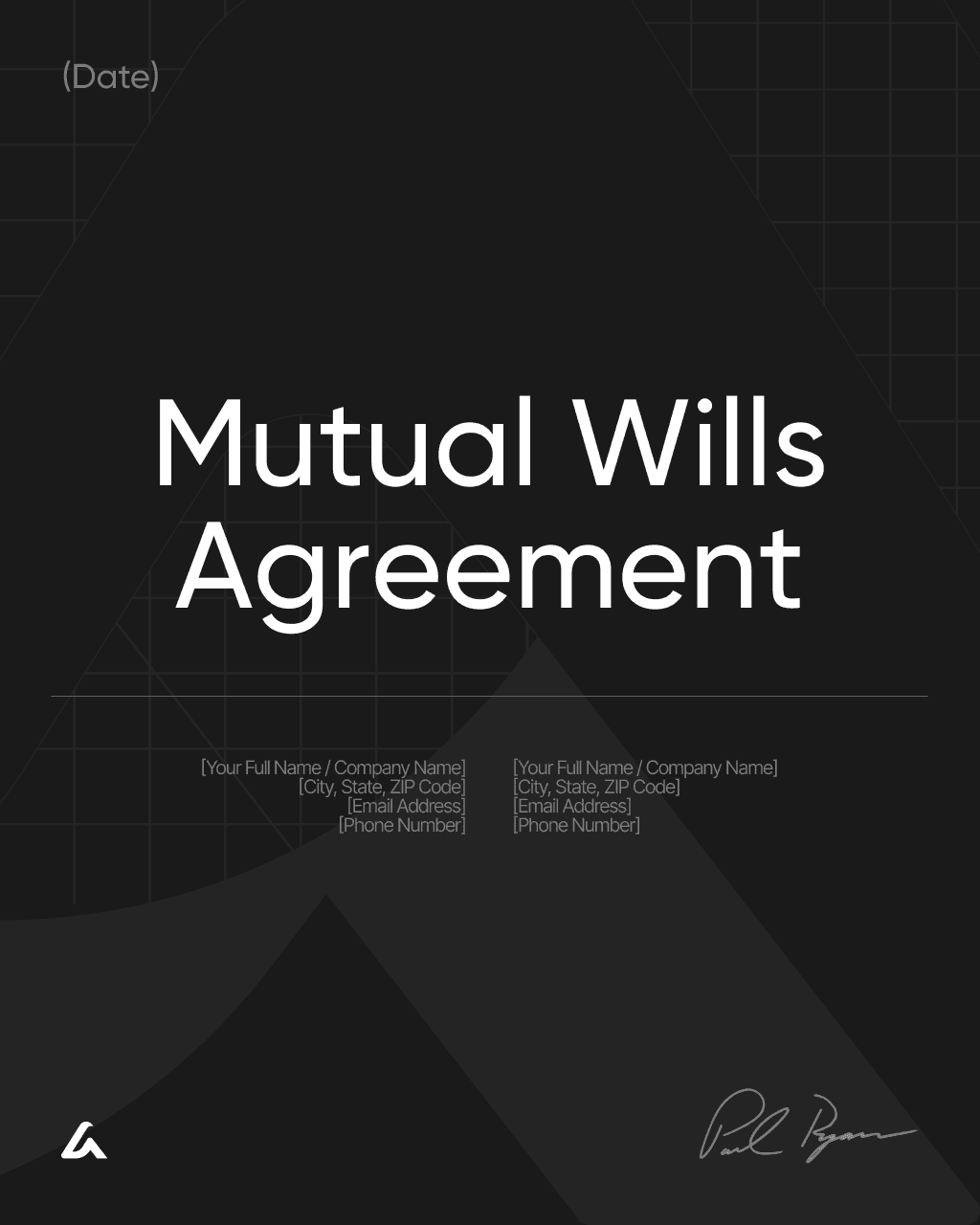
A Mutual Wills Agreement Template documents an arrangement where two people, often spouses or long-term partners, agree to make wills with coordinated terms and to maintain those terms according to agreed conditions. It is commonly used in estate planning where the parties want to align how assets will pass on death, especially when supporting a surviving partner while also protecting inheritances for children or other beneficiaries. The agreement typically sits alongside each person’s individual will and clarifies the shared intentions, the core distributions, and any restrictions on changing the plan after certain events. Its purpose is to create a written record of the parties’ agreement and reduce uncertainty or disputes about whether one party may later alter their estate plan.
This template often addresses the scope of the mutual arrangement, including which assets are covered, how gifts or residue will be distributed, and whether changes are permitted during both parties’ lifetimes with mutual consent. It may include obligations to notify the other party of updates, commitments to maintain certain beneficiary designations, and rules for managing the estate after the first death, such as placing assets in trust or limiting transfers that would defeat the agreed plan. Many agreements also include representations about capacity, independent advice, and full disclosure of assets, along with dispute resolution terms and governing law. Because enforceability and formal requirements can vary by jurisdiction, careful alignment with local estate rules and the associated wills is often important. Clear mutual terms can help support predictable planning while still documenting agreed boundaries on future changes.
Download Template: Mutual Wills Agreement Template
For more information please refer to our article:
Or create your own document yourself with the help of AI.
1.6 Will with Testamentary Trust Template
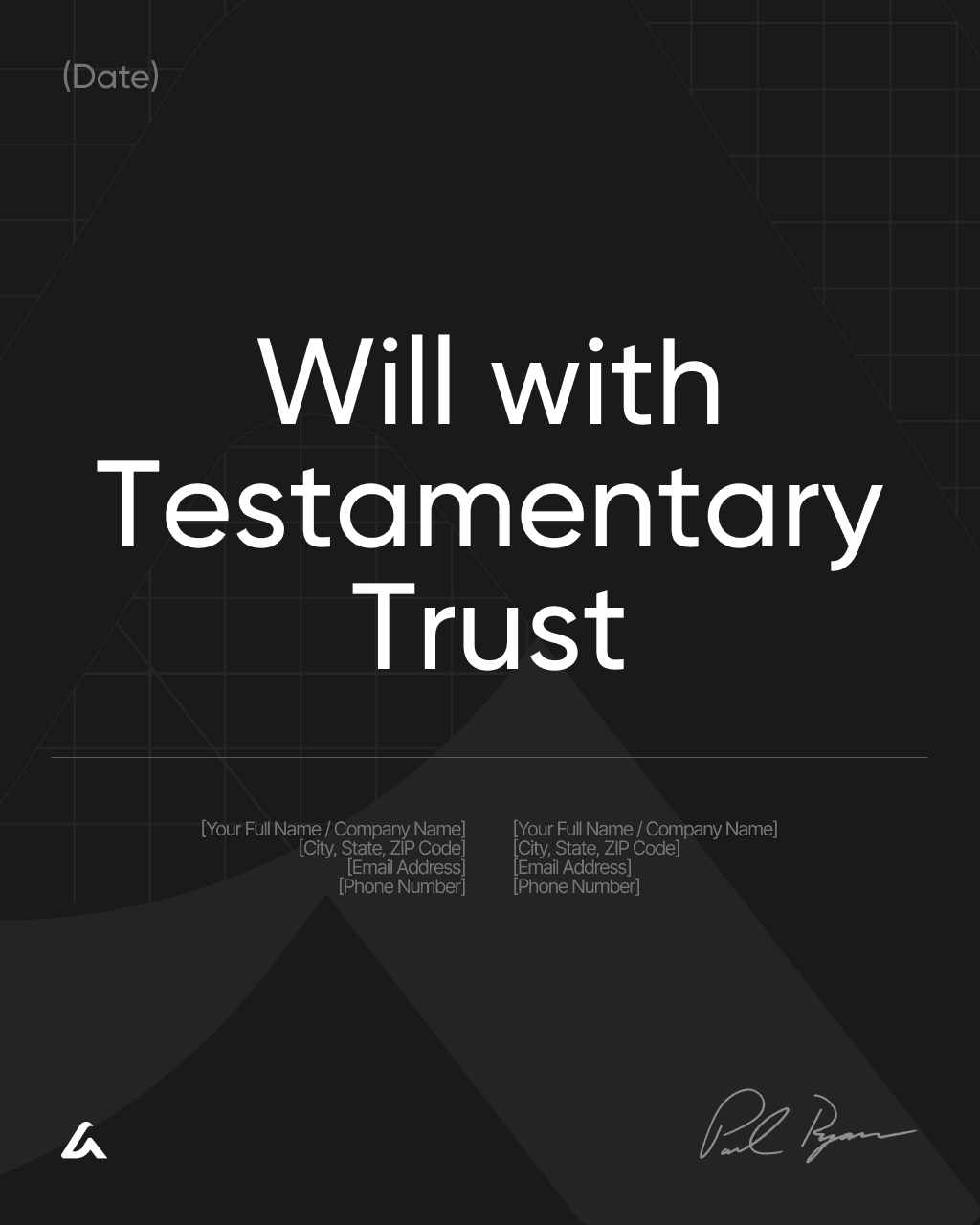
A Will with Testamentary Trust Template is an estate planning document where a person’s will creates a trust that becomes effective upon their death. It is commonly used when assets should be managed for beneficiaries over time, such as minor children, beneficiaries with special financial needs, or situations where staged distributions are preferred. The will typically names an executor to administer the estate and a trustee to manage trust assets under defined terms, including how and when beneficiaries receive distributions. Its purpose is to combine a standard will with a structured management plan so inheritances can be protected and administered according to clear instructions.
This template usually sets out the trust’s beneficiaries, trustee powers and duties, and distribution rules, such as discretionary support, age-based payouts, or milestone-based releases. It often addresses funding mechanics, including which assets pour into the trust, handling of debts and taxes, and whether separate trusts are created for different beneficiaries. Many testamentary trust wills include provisions for successor trustees, accounting requirements, and safeguards that limit misuse, along with spendthrift language where permitted to help protect assets from creditors. The template may also coordinate guardianship nominations for minor children and clarify how disputes will be handled within the estate administration process. Because probate and trust formalities vary by jurisdiction, aligning the will’s execution requirements with local law is often essential for effective implementation.
Download Template: Mutual Wills Agreement Template
For more information please refer to our article:
Or create your own document yourself with the help of AI.
1.7 Affidavit of Witness to a Will Template
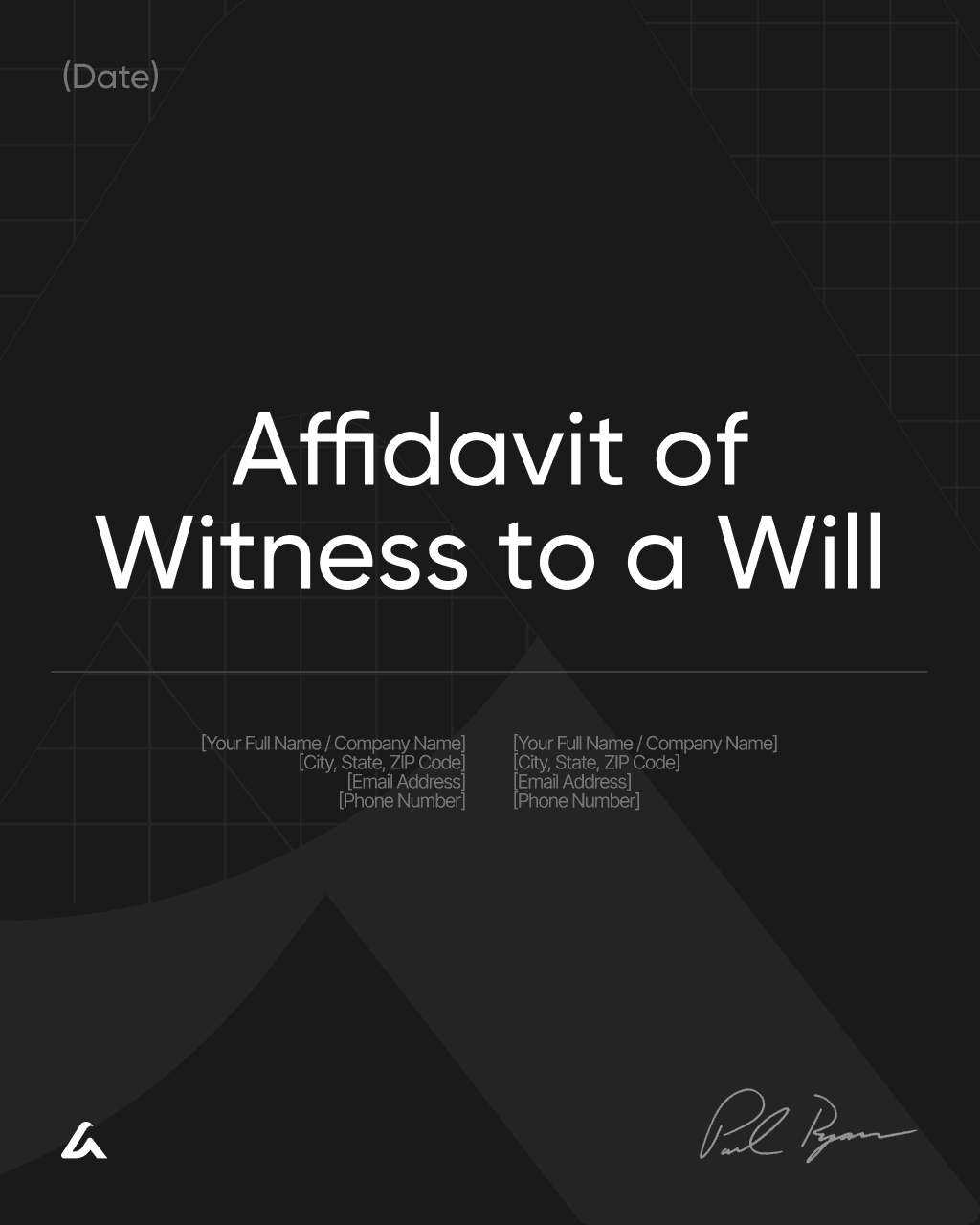
An Affidavit of Witness to a Will Template is a sworn statement signed by a person who witnessed the execution of a will, confirming that the will was properly signed and witnessed. It is commonly used in estate planning to support probate by providing evidence that the will was executed in accordance with required formalities. The affidavit typically identifies the testator and the witnesses, confirms the circumstances of signing, and may be attached to or stored with the will for later use. Its purpose is to streamline the probate process by reducing the need to locate witnesses years later and by creating a clear record of proper execution.
This template usually includes statements that the testator appeared to be of legal age and capacity, signed the will willingly, and did so in the presence of the witnesses, who then signed as witnesses in the testator’s presence. It often includes a notary or jurat section because the affidavit is sworn, and it may reference the date and place of execution and the witness’s identifying details. Many versions include confirmations that the witness is not a beneficiary and has no undue influence over the testator, where independence is relevant. Because probate rules and execution requirements vary by jurisdiction, the affidavit must match local witnessing and notarization standards and the will’s execution format. Clear, properly executed affidavits can help reduce probate delays and challenges to the will’s validity.
Download Template: Affidavit of Witness to a Will Template
For more information please refer to our article:
Or create your own document yourself with the help of AI.
1.8 Small Estate Affidavit Template
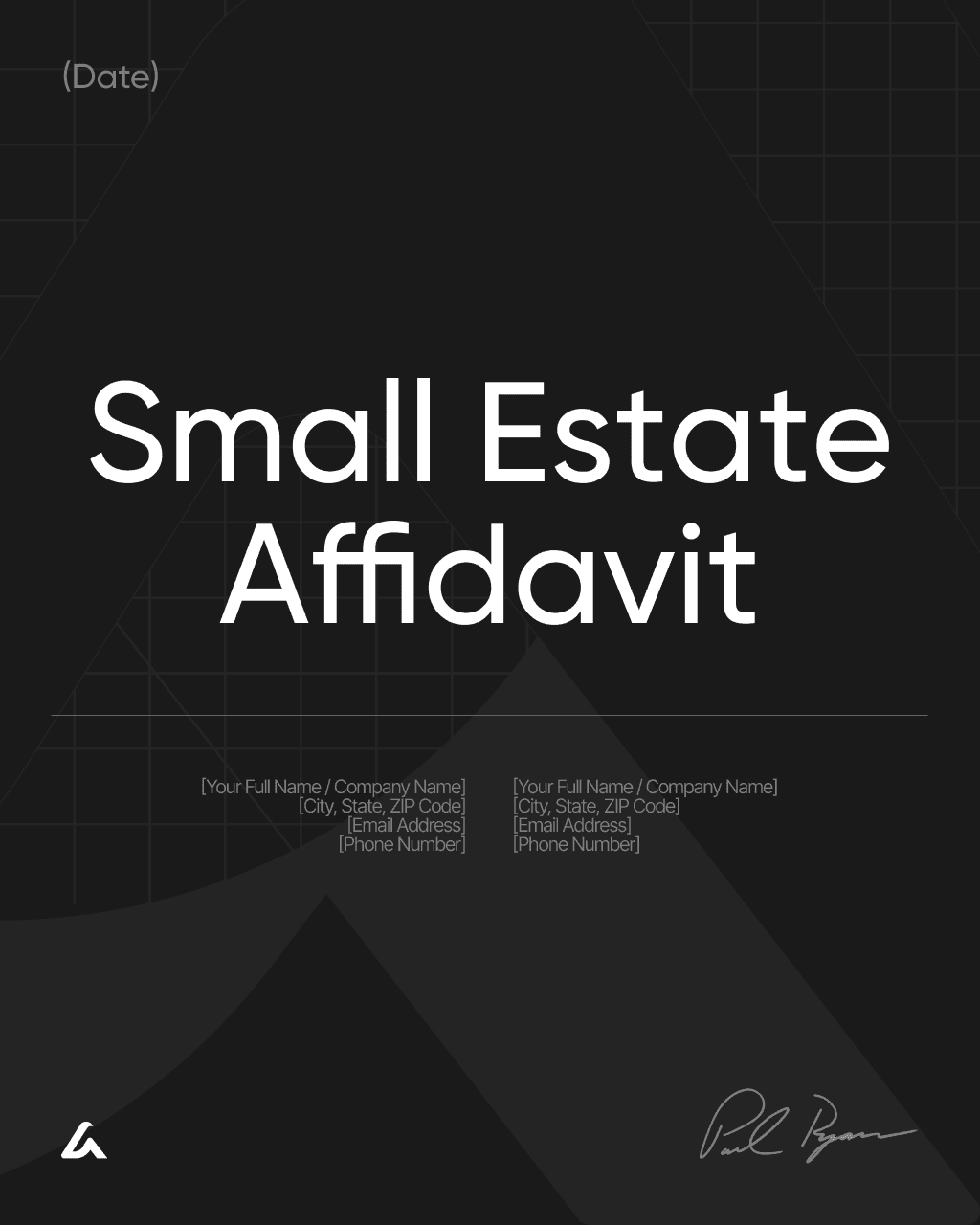
A Small Estate Affidavit Template is a sworn statement used to collect or transfer certain assets of a deceased person without opening a full probate case, when the estate qualifies under a jurisdiction’s small-estate threshold. It is commonly used by heirs or legal representatives to access bank accounts, claim refunds, transfer personal property, or receive distributions from financial institutions when the total estate value is below a statutory limit and other conditions are met. The affidavit typically identifies the decedent, the affiant’s relationship and entitlement, and the assets being claimed, creating a formal record institutions can rely on. Its purpose is to streamline estate administration for smaller estates while providing a standardized declaration of authority and beneficiary rights.
This template usually includes the date of death, domicile information, a list of estate assets and values, confirmation that required waiting periods have passed, and statements that no probate proceeding is pending or required under local rules. It often includes heirship details, notices to other heirs where required, and an indemnity or hold-harmless provision requested by institutions releasing assets. Many small estate affidavits require attachments such as a certified death certificate, proof of identity, and documentation supporting heirship or entitlement, and may require notarization. Because eligibility thresholds, asset types covered, and procedural requirements vary significantly by state or country, the template is designed to be adaptable while keeping statements clear and verifiable. Clear small estate affidavits help reduce delays and provide an efficient path to transfer qualifying assets.
Download Template: Small Estate Affidavit Template
For more information please refer to our article:
Or create your own document yourself with the help of AI.
1.9 Affidavit of Survivorship Template
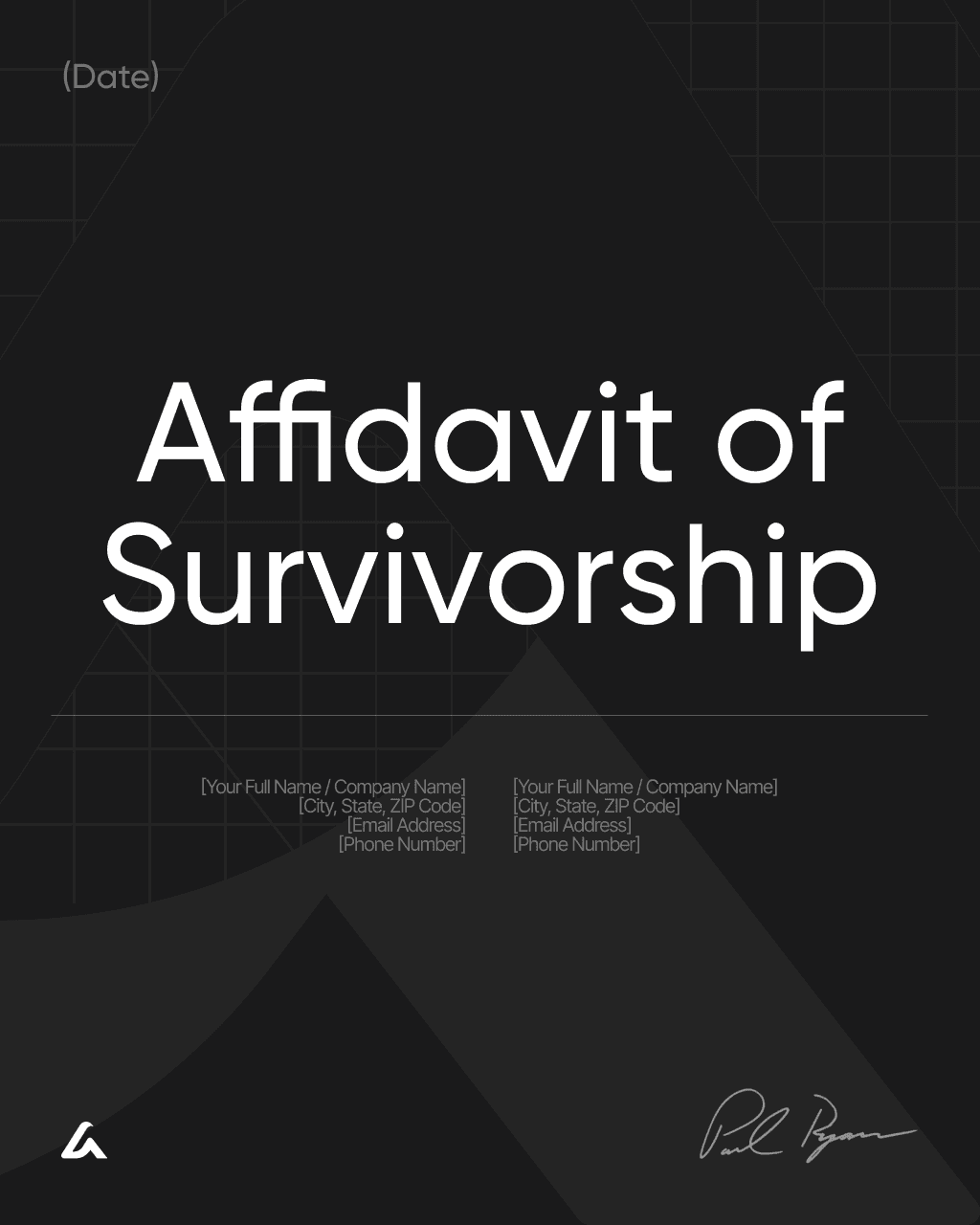
An Affidavit of Survivorship Template is a sworn statement used to confirm that a joint owner of property has died and that the surviving joint owner(s) now hold full rights to the property under a survivorship arrangement. It is commonly used for jointly owned real estate held as joint tenants with right of survivorship or tenancy by the entirety, and may also be used for certain jointly held financial accounts where institutions request formal documentation. The affidavit identifies the deceased owner, the surviving owner, and the property, providing a clear record of the change in ownership due to death. Its purpose is to support administrative updates and, in real estate contexts, to facilitate recording that clarifies title without requiring a probate transfer for that asset.
This template typically includes the names of the owners, the date of death, the property legal description or account identifiers, and a statement that the survivorship form of ownership applies. It often attaches a certified death certificate and includes notarization, and in real estate situations it may be recorded in the local land records office to update the chain of title. Many affidavits also reference the original deed recording information and confirm that the surviving owner is entitled to the deceased owner’s interest by operation of law. Because survivorship rules and recording requirements vary by jurisdiction and by how title is held, the template is designed to remain factual and to align with the underlying deed or account agreement. Clear survivorship documentation helps reduce delays in refinancing, sale, or estate administration by establishing clean title records.
Download Template: Affidavit of Survivorship Template
For more information please refer to our article:
Or create your own document yourself with the help of AI.
1.10 Self-Proving Affidavit Template
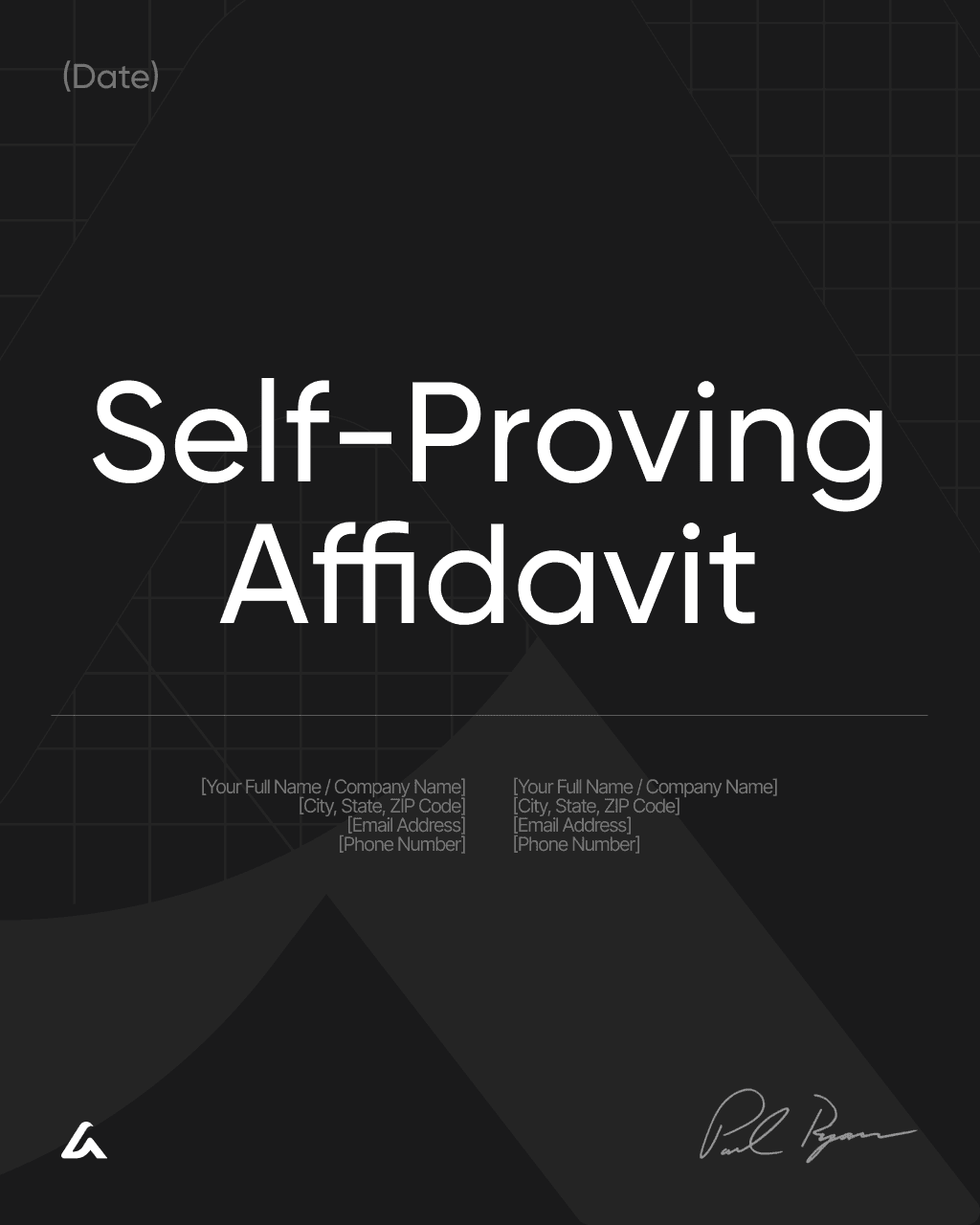
A Self-Proving Affidavit Template is a sworn statement signed in connection with a will to help streamline probate by confirming the will was properly executed. It is commonly used in jurisdictions that allow a will to be “self-proved,” meaning the court can accept the will without requiring the witnesses to appear later to testify about signing formalities. The affidavit is typically signed by the testator and the witnesses in the presence of a notary, and it is stored with the will as part of the estate plan. Its purpose is to reduce delays and administrative burden by providing a contemporaneous, notarized record that execution requirements were satisfied.
This template typically includes statements that the testator signed the will voluntarily, was of sound mind, and executed the document in the presence of witnesses who also signed in the testator’s presence. It often includes the names and addresses of the witnesses, notary acknowledgment language, and signature blocks with dates, and it may reference the will’s date to link the documents clearly. Many self-proving affidavits require strict compliance with statutory wording and notarization formalities to be effective, and some jurisdictions allow alternative forms or separate “proof of will” procedures. Because requirements vary by state and may affect probate acceptance, the template is designed to be adaptable while remaining consistent with common statutory elements. A properly executed self-proving affidavit can make probate smoother by reducing the need to locate witnesses years later.
Download Template: Self-Proving Affidavit Template
For more information please refer to our article:
Or create your own document yourself with the help of AI.
📘 Overview: Which Type of Will Should You Create?
Not sure whether you need a formally witnessed will with a Self-Proving Affidavit or a handwritten Holographic Will? Each type of testamentary document serves a distinct purpose, depending on your circumstances, jurisdiction, and available resources. A properly executed will provides certainty about how your assets will be distributed, who will manage your estate, and how to minimize disputes during probate. Choosing the right format ensures your final wishes are honored and your loved ones are protected under the law.
A Self-Proving Affidavit enhances a traditional witnessed will by making it “self-proving” in probate—meaning courts can accept it without requiring witnesses to testify later. This is the most reliable and widely recognized form across the United States, offering speed and procedural security. A Holographic Will, by contrast, is entirely handwritten and valid only in certain jurisdictions. It serves as an emergency or last-resort option when witnesses or notaries are unavailable. While easier to create, it carries substantial risks of invalidation, contestation, and jurisdictional non-recognition.
The table below compares the two main will types, outlining their validity, execution requirements, and associated legal risks. Use this guide to determine which approach best fits your situation—whether you are preparing a formal estate plan or writing an emergency testament under pressing conditions. A clear understanding of these distinctions ensures that your will remains enforceable, compliant, and aligned with your intentions.
Document Type | Validity & Use Case | Witness Requirements | Legal Risks / Notes |
|---|---|---|---|
Recognition: Allowed in nearly all U.S. states (only D.C., OH, MD, VT excluded). Purpose: Makes a formally executed will “self-proving,” so the will is accepted in probate without live witness testimony. | Executed at will signing by the testator and two witnesses, in front of a notary who then notarizes their sworn affidavit. (Does not replace the need for witnesses – it simply supplements their signatures with an oath.) | Streamlines probate: If included, no need to locate witnesses years later. If omitted, probate may be delayed to obtain witness statements or testimony. Ensure proper execution (all signatures and notary seal) — a defect could nullify the self-proving effect, though the will itself might still be valid. | |
Recognition: Valid in ~26 states and several provinces (e.g., CA, TX, Ontario) if meeting requirements. Not recognized at all in many states (e.g., FL, GA, IL, NY — except for soldiers). Use Case: Informal will when no opportunity for a formal will (emergency, military deployment, etc.). Should be replaced by a standard will when possible. | Witnesses at execution: None required if jurisdiction permits holographic wills. The testator alone writes and signs it. Probate proof: Typically requires two people (after death) to swear the handwriting is the testator’s, unless the will was made self-proving by a separate affidavit. | High Contest Risk: No witnesses or formal drafting means it’s easily challenged. Courts scrutinize handwriting authenticity, and vague wording can spark disputes. Forgery/Alteration risk: No witnesses to deter or observe fraud. Often omits key provisions (e.g., executor, alternate heirs), leading to gaps or intestacy. Critically, if any formal requirement (date, full signature, etc.) is missing, the will can be deemed invalid. Best used only in extreme situations, with potential probate hurdles. | |
Recognition: Universally recognized when executed according to state formalities. Purpose: Primary legal document directing distribution of assets, appointing executors and guardians, and expressing final wishes. Required for orderly estate administration. | Witnesses at execution: Typically two competent adult witnesses must observe the testator’s signature and sign in each other’s presence. Some states require notarization or allow self-proving affidavits to simplify probate. | Legal Certainty: Properly executed wills are rarely contested and are presumed valid. Risks: Omitting witnesses or failing to meet state-specific formalities can render the will invalid. Ambiguities or outdated clauses can cause disputes. Regular review and updates are essential—especially after marriage, divorce, or relocation. Using an AI-reviewed template ensures compliance and reduces drafting errors. | |
Used to formally record a person’s medical treatment preferences and end-of-life decisions in advance, to be followed if they become incapacitated and unable to communicate. Commonly used in healthcare planning and often paired with a Medical Power of Attorney. | Execution requirements vary by jurisdiction. Commonly requires the principal’s signature plus either witnesses, notarization, or both. Some states prohibit certain individuals (healthcare providers, heirs) from acting as witnesses. | If not executed according to local law, the directive may be unenforceable. Vague or overly general language can cause uncertainty for healthcare providers. Must be updated to reflect changes in medical wishes, laws, or personal circumstances. Should be accessible to doctors and hospitals to be effective in practice. | |
Used when two people agree to coordinated wills and limits on changing the estate plan, often to protect agreed beneficiaries after the first death. | Typically executed as a contract by both parties; separate wills still require the formal signing and witnessing rules of the applicable jurisdiction. | Enforceability varies by jurisdiction; avoid confusion with “mirror wills” and ensure terms do not conflict with later wills or beneficiary designations. | |
Used when a will creates a trust at death to manage and distribute assets over time, often for minors or beneficiaries needing structured support. | Must follow the jurisdiction’s will execution rules (typically testator signature with required witnesses); the trust terms are established through the will. | Probate-driven setup can delay funding; trustee selection and trust terms must be clear to avoid disputes and unintended tax or distribution outcomes. | |
Used to document, under oath, that the witnesses observed proper execution of a will, supporting smoother probate later. | Typically signed by a will witness and notarized; confirms the will was signed in compliance with required execution formalities. | Must match local will execution rules; improper notarization or inconsistent details can reduce probative value and may delay probate. | |
Used to collect/transfer qualifying assets without full probate when the estate falls under a small-estate threshold. | Executed as a sworn statement; witnesses typically not required unless local rules or institution policies require. | Thresholds and waiting periods vary; institutions may require indemnity and supporting proof of heirship. | |
Used to confirm a joint owner’s death and support transfer to the surviving owner under survivorship title. | Signed by the surviving owner (or affiant) and typically notarized; witnesses generally not required. | Must match the deed/account title form; often recorded for real estate; errors can delay title clearance. | |
Used with a will to make execution self-proving and reduce the need to locate witnesses during probate. | Executed at will signing by the testator and two witnesses, in front of a notary who notarizes the affidavit. | Strict execution formalities apply; omission can delay probate; defective notarization can negate self-proving effect. |
2. Jurisdictional Peculiarities of Wills in the USA
Each U.S. state sets its own legal standards for what makes a Last Will and Testament valid — from the number of required witnesses to the acceptance of handwritten (holographic) or electronic wills. While the federal government has no unified will law, state probate codes define how wills must be executed, witnessed, and proven in court.
Below, we examine the four major regions — West Coast, Northeast, South, and Midwest — with a focus on the states most frequently searched by users: California, Washington, New York, Texas, Florida, and Illinois. Each subsection outlines the relevant documents, specific rules, common mistakes, popular search trends, and how AI Lawyer helps ensure compliance with local estate laws.
2.1 West Coast: California and Washington
The West Coast’s progressive legal landscape embraces technology and flexibility, but both states enforce strict procedural compliance when it comes to estate planning documents.
California: handwritten wills and strict witness presence
Actual Documents: Last Will and Testament, Holographic Will, Self-Proving Affidavit.
Requirements and nuances: Under California Probate Code §§6110–6111, a valid will must be signed by the testator and witnessed by two people present at the same time. California also recognizes holographic wills — handwritten and signed by the testator — without witnesses, as long as the signature and material provisions are in the testator’s handwriting.
Notarization isn’t required, but most Californians add a self-proving affidavit to streamline probate.
An “interested witness” (a witness who is also a beneficiary) doesn’t invalidate the will, but the gift to that witness is presumed to result from undue influence — a presumption that can only be overcome with proof or the presence of two other disinterested witnesses.
Common Searches:
“How to make a valid will in California”
“California holographic will rules”
Common Mistakes: Allowing a beneficiary to witness the will; failing to sign in the simultaneous presence of witnesses; or including extra text after the testator’s signature (which can nullify later provisions).
How AI Lawyer helps: AI Lawyer ensures California wills include all statutory witness clauses, automatically generates a self-proving affidavit, and warns users if any listed witness is also a beneficiary. Templates comply with the California Probate Code and avoid common execution errors that can cause probate disputes.
Washington: flexible formalities with modern updates
Actual Documents: Attested Will, Self-Proving Affidavit.
Requirements and nuances: According to RCW 11.12.020, a will must be signed by the testator and two competent witnesses present at the same time. Washington does not recognize holographic wills, but it became one of the first states to legalize electronic wills and remote witnessing under RCW 11.12.400–480.
These laws allow digital signatures and secure video witnessing, provided specific authentication standards are met.
Common Searches:
“Washington state electronic will law”
“Can you handwrite a will in Washington?”
Common Mistakes: Assuming a handwritten will is valid; failing to retain the digital video record of an e-will; or missing the required two-witness ceremony.
How AI Lawyer helps: AI Lawyer offers both physical and digital will templates for Washington, automatically embedding the necessary attestation and electronic compliance clauses. It validates file format, signature method, and witness requirements to ensure full enforceability under RCW 11.12.
2.2 Northeast: New York
New York combines formal common-law tradition with some of the most detailed witnessing rules in the country.
New York: strict timing and limited exceptions
Actual Documents: Last Will and Testament, Self-Proving Affidavit, Military (Holographic) Will.
Requirements and nuances: Under EPTL §3-2.1, a will must be signed by the testator (or another person under their direction) and attested by two witnesses within 30 days of each other’s signature.
Holographic and oral (nuncupative) wills are valid only for active-duty military personnel and mariners at sea — and only temporarily after discharge. Notarization isn’t required, but a self-proving affidavit may be attached to avoid later witness testimony.
Common Searches:
“New York will witness rules 30 days”
“Can a handwritten will be valid in NY?”
Common Mistakes: Failing to observe the 30-day witness rule; having a beneficiary act as a witness (voiding their gift); or omitting witness address lines (recommended though not mandatory).
How AI Lawyer helps: AI Lawyer enforces New York’s 30-day rule automatically, checks for disinterested witnesses, and attaches a self-proving affidavit. Templates are updated with EPTL changes, ensuring compliance with one of the country’s strictest probate codes.
2.3 Southern States: Texas and Florida
The South tends toward simplicity and self-sufficiency, but key distinctions exist between states that recognize holographic wills and those that don’t.
Texas: handwritten wills accepted, notarization optional
Actual Documents: Formal Will, Holographic Will, Self-Proving Affidavit.
Requirements and nuances: Texas allows both attested wills (signed by the testator and two witnesses aged 14+) and holographic wills — handwritten and signed without witnesses.
A notarized self-proving affidavit is optional but recommended, allowing probate without witness testimony.
Texas also recognizes limited oral (nuncupative) wills for military personnel in imminent peril.
Common Searches:
“Texas holographic will requirements”
“Do wills in Texas need notarization?”
Common Mistakes: Failing to sign; mixing typed and handwritten text in a holographic will; or omitting the affidavit, making probate more complex.
How AI Lawyer helps: AI Lawyer drafts Texas wills with built-in self-proving affidavits, validates handwriting or typed format, and ensures compliance with Texas Estates Code §§251–256. The system reminds users to notarize if they select a self-proved form.
Florida: no holographic wills, but allows electronic signing
Actual Documents: Attested Will, Electronic Will, Self-Proving Affidavit.
Requirements and nuances: Under Florida Statutes §732.502, a will must be signed at the end by the testator and witnessed by two people present together.
Florida explicitly rejects holographic and oral wills, even if valid elsewhere.
Under the Florida Electronic Wills Act (2019), electronic and remotely notarized wills are permitted when identity verification and recording standards are met.
Common Searches:
“Electronic wills in Florida”
“Florida will witness requirements”
Common Mistakes: Failing to have witnesses present simultaneously; assuming a handwritten will is valid; or omitting the self-proving affidavit that simplifies probate.
How AI Lawyer helps: AI Lawyer provides both standard and electronic Florida will templates, includes proper witness and notary sections, and verifies that all e-signing steps meet Chapter 732 probate rules.
2.4 Midwest: Illinois
Illinois combines traditional formalities with clear statutory language and uniform probate standards.
Illinois: two witnesses, no holographic exceptions
Actual Documents: Last Will and Testament, Self-Proving Affidavit.
Requirements and nuances: Under 755 ILCS 5/4-3, a will must be signed by the testator and two witnesses present together. Illinois does not recognize holographic or oral wills.
A self-proving affidavit signed before a notary can eliminate the need to locate witnesses later.
Common Searches:
“Illinois will witness requirements”
“Self-proving affidavit for Illinois wills”
Common Mistakes: Using a handwritten will without witnesses; forgetting to notarize the affidavit; or allowing a beneficiary to serve as witness.
How AI Lawyer helps: AI Lawyer automatically applies Illinois witness formatting, attaches a self-proving affidavit, and includes probate-filing instructions. Templates comply with 755 ILCS 5/4-3 and are designed for smooth acceptance in Cook County and beyond.
Summary
Regional variations in Will requirements across the United States are substantial. California and Texas accept handwritten wills; Florida and Illinois reject them. New York enforces a unique 30-day witness rule, and Washington now allows fully electronic execution.
By adapting to these state-level differences, AI Lawyer ensures every will — whether holographic, witnessed, or electronic — meets the formalities required for probate. Each template dynamically adjusts to the user’s state law, includes witness verification and affidavit options, and automatically flags noncompliant provisions before signing.
With AI Lawyer, your estate documents are always valid, compliant, and ready for filing — in any U.S. jurisdiction.
3. 2024–2025 Developments in Digital Wills and Probate
The landscape of business documentation is undergoing rapid transformation, driven by digital innovation, global compliance reform, and the widespread adoption of AI in legal workflows. What was once a manual and paper-heavy process is now becoming an intelligent, automated system that integrates drafting, approval, and compliance monitoring into one seamless framework. Between 2024 and 2025, companies are increasingly digitizing every stage of their document lifecycle—from incorporation filings and board resolutions to multi-jurisdictional contracts—embracing tools that enhance accuracy, traceability, and regulatory alignment.
Modern business documents now function as both operational and compliance tools. They incorporate dynamic clauses that adapt to new laws, digital signature verification for authenticity, and built-in ESG and data governance language to meet emerging disclosure standards. Governments are rolling out new digital filing systems, while AI-powered drafting and review tools are setting a new standard for speed and legal precision. Businesses that embrace these changes are not just keeping up with regulations—they’re turning documentation into a strategic advantage, ensuring every contract, policy, and filing is both compliant and future-ready.
3.1 📍 Digital Wills & Modern Estate Execution
The Last Will and Testament is undergoing a major digital transformation as more U.S. states move to recognize electronic wills (e-wills). By 2025, jurisdictions such as Florida, Arizona, Nevada, and Washington have adopted frameworks allowing wills to be signed, witnessed, and notarized entirely online. The Uniform Electronic Wills Act (UEWA) — developed by the Uniform Law Commission — has become the foundation for these reforms, enabling remote witnessing through video platforms and secure electronic signatures. This modernization expands access to estate planning, particularly for remote or mobility-limited individuals, while introducing new safeguards through digital certificates, encrypted storage, and blockchain-based verification.
Artificial intelligence is also reshaping how wills are drafted and managed. AI-powered estate planning platforms now generate customized clauses, validate compliance with state laws, and automatically include self-proving affidavits. Combined with cloud-based “digital vaults” for managing passwords, crypto keys, and online accounts, these tools make estate administration faster, more secure, and better aligned with the realities of digital assets. Together, these innovations mark a shift toward a paperless, intelligent approach to legacy management — where the will becomes a living digital instrument rather than a static document.
📜 Read full analysis →
✨ Create a digital will with AI →
🚀 Generate your own document with AI →
3.2 📍 Electronic Will Legislation & Blockchain Verification
Estate law is rapidly evolving as electronic wills gain legal recognition across the United States. Following the Uniform Electronic Wills Act (UEWA), several states — including Missouri, Florida, and Washington — have enacted statutes that allow wills to be executed, witnessed, and notarized remotely. These laws respond to the realities of a digital society, where testators increasingly own online assets, from crypto wallets to social media accounts. By authorizing secure video witnessing and digital signatures, states aim to make estate planning more accessible, especially for individuals unable to meet in person. The move also ensures continuity of legal processes during emergencies or remote living situations — a lesson learned from the COVID-19 era.
Blockchain and artificial intelligence are now enhancing this transformation. Blockchain technology provides tamper-proof timestamping and digital registration, ensuring that wills cannot be altered after execution. Meanwhile, AI-driven legal tools assist users in drafting and updating wills, checking compliance with local probate rules, and managing encrypted digital asset inventories. Together, these technologies are establishing a new paradigm of estate security and transparency — where inheritance can be planned, verified, and even partially automated through trusted digital infrastructure.
📜 Read full analysis →
✨ Create an AI-powered electronic will →
🚀 Generate your own document with AI →
3.3 📍 Remote Witnessing & AI-Powered Estate Planning
By 2025, remote witnessing and electronic notarization have become core features of modern estate planning. States such as Nevada, Arizona, and Washington now permit testators to execute wills entirely online, using secure video conferencing platforms and verified digital IDs. These reforms stem from the Uniform Electronic Wills Act (UEWA), which standardizes the process for e-will creation and ensures legal validity across jurisdictions. The shift toward remote execution not only streamlines estate preparation but also democratizes access — allowing elderly, disabled, and geographically isolated individuals to finalize their wills without leaving home. Digital storage solutions and encrypted notarization systems further guarantee the authenticity and long-term preservation of testamentary documents.
Simultaneously, artificial intelligence is redefining how estate documents are drafted and maintained. AI-driven platforms can now analyze asset portfolios, detect inconsistencies in distribution clauses, and recommend tax-efficient adjustments in real time. Some systems even integrate Revised Uniform Fiduciary Access to Digital Assets Act (RUFADAA) provisions, ensuring executors can legally manage online accounts and crypto assets. As these technologies mature, the traditional handwritten will is giving way to an intelligent, adaptive digital instrument — one that evolves alongside a person’s financial and digital life.
📜 Read full analysis →
✨ Create a self-proving affidavit for your e-will →
🚀 Generate your own document with AI →
3.4 📍 The Rise of Fully Digital Estate Ecosystems
Estate planning in 2025 has expanded far beyond paper wills and courthouse filings — it now operates within interconnected digital ecosystems. Online estate platforms enable users to create, sign, store, and even execute wills through encrypted portals linked to cloud and blockchain services. The process, once dominated by lawyers and notaries, has become faster, more transparent, and accessible to the public. Under frameworks like the Uniform Electronic Wills Act (UEWA), a will can be executed remotely with verified witnesses, and stored in tamper-proof registries that courts can access during probate. This legal modernization reflects the growing digital nature of personal wealth — where assets such as cryptocurrencies, online accounts, and virtual property require new mechanisms of control and inheritance.
These platforms increasingly rely on AI automation to maintain legal precision. Algorithms can detect missing executor clauses, validate witness requirements, and cross-check compliance with each state’s probate code. Some solutions use biometric verification to confirm a testator’s identity, while others employ smart contracts that automatically release funds or transfer tokens upon death certification. Together, these innovations are redefining how legacy, property, and intent are preserved — moving from a static, notarized document to a dynamic, verifiable digital estate that integrates technology, law, and trust in equal measure.
📜 Read full analysis →
✨ Create a fully digital will with AI →
🚀 Generate your own document with AI →
3.5 📍 Smart Contracts & Automated Inheritance
The next frontier for wills and estates is automation. In 2025 a small but growing number of jurisdictions are experimenting with blockchain-based “smart inheritance” systems that release digital assets once death is verified by an official record. These tools, layered on top of the Uniform Electronic Wills Act (UEWA), use distributed ledgers to timestamp and lock testamentary instructions so they cannot be changed after execution. For tech-savvy testators who hold cryptocurrency, domain names, or tokenized real estate, smart contracts provide a transparent way to ensure those assets pass to the right heirs without lengthy probate delays.
Lawmakers and courts are still cautious: automatic transfers must coexist with existing probate safeguards, tax reviews, and the right to contest a will. Yet legal-tech start-ups in the U.S. and EU are already piloting hybrid models—combining notarized e-wills with blockchain verification and executor dashboards that trigger once an official death certificate is uploaded. The result is an emerging framework where digital identity, asset custody, and testamentary intent converge, making inheritance not only faster but more accountable and secure.
📜 Read full analysis →
✨ Create a smart-contract enabled will with AI →
🚀 Generate your own document with AI →
3.6 📍 Cloud Storage, Cybersecurity & the Future of Will Authentication
As wills move online, cybersecurity has become central to estate law. By 2025, most digital will platforms rely on cloud-based encrypted storage with multi-factor authentication to prevent unauthorized access or tampering. States adopting the Uniform Electronic Wills Act (UEWA) now require that electronic wills be stored in secure, access-controlled environments—either by certified custodians or through approved legal-tech providers. These custodians maintain “digital originals,” complete with cryptographic hashes and timestamp logs that prove authenticity in court. In parallel, probate courts are beginning to accept blockchain-verified will certificates as evidence of integrity, dramatically reducing disputes over forged or altered documents.
For individuals, this shift represents both empowerment and responsibility. Secure “digital vaults” now allow testators to manage passwords, financial logins, and crypto wallet keys alongside their wills, ensuring executors can retrieve digital property safely. AI-based monitoring systems alert users to outdated clauses, missing witnesses, or unverified signers, providing continuous compliance support. Together, these technologies form a secure digital chain of custody for one’s final wishes — transforming will authentication from a paper trail into a transparent, encrypted data stream that stands the test of time.
📜 Read full analysis →
✨ Create a smart digital will with AI →
🚀 Generate your own document with AI →
4. Conclusion: Using AI Templates to Ensure Testamentary Clarity and Legal Validity
Estate planning is undergoing a profound digital transformation, and Artificial Intelligence is redefining how wills, trusts, and probate documents are created and managed. A will is one of the most important legal documents in a person’s life — yet it’s also one of the easiest to get wrong. Minor technical errors, outdated clauses, or vague language can lead to disputes, probate delays, or even invalidation. AI-powered templates now address these long-standing challenges by embedding jurisdiction-specific requirements directly into the drafting process. Every clause — from witness statements to executor powers — is automatically aligned with local law, ensuring legal compliance and clarity from the moment the document is created.
Modern AI tools don’t just automate form-filling — they think like lawyers. Using natural language processing and legal data training, AI templates identify ambiguous phrasing, flag missing details, and suggest standardized language proven to hold up in court. They can prompt users to clarify key issues (“Do you wish to include future children?” or “Would you like to name an alternate executor?”), reducing the risk of confusion later. Because they’re updated in real time with legislative changes, these templates ensure users are never relying on outdated or invalid provisions. Whether dealing with a digital asset clause, a self-proving affidavit, or state-specific signing formalities, the result is a document that’s enforceable, modern, and crystal clear.
Beyond compliance, AI tools make estate planning more accessible and secure. Anyone can create or update a will online, sign it electronically where permitted, and store it safely in encrypted digital vaults. This eliminates the problem of lost originals and allows quick updates as life circumstances change — a new property, child, or marriage. For many, this means the first truly living, dynamic estate plan: one that evolves alongside its creator.
Ultimately, AI-driven estate templates bring together the precision of legal expertise and the convenience of technology. They reduce human error, enhance clarity, and protect legacies more effectively than ever before. In a world where both assets and laws are increasingly digital, these tools ensure that your final wishes are expressed with certainty — and executed with confidence.
🚀 Generate your own Will or Estate Planning Documents with AI →
How it works
How to Get a Ready-Made Document in Minutes?
Choose a Category
Browse available categories or use search to quickly find the document you need.
Edit with AI
Use the built-in AI chat to quickly customize and adapt the template to your needs.
Download the Document
Download your ready-made document in a convenient format
Use It Hassle-Free
Your document is fully prepared—send, sign, or use it as needed.
Most popular







